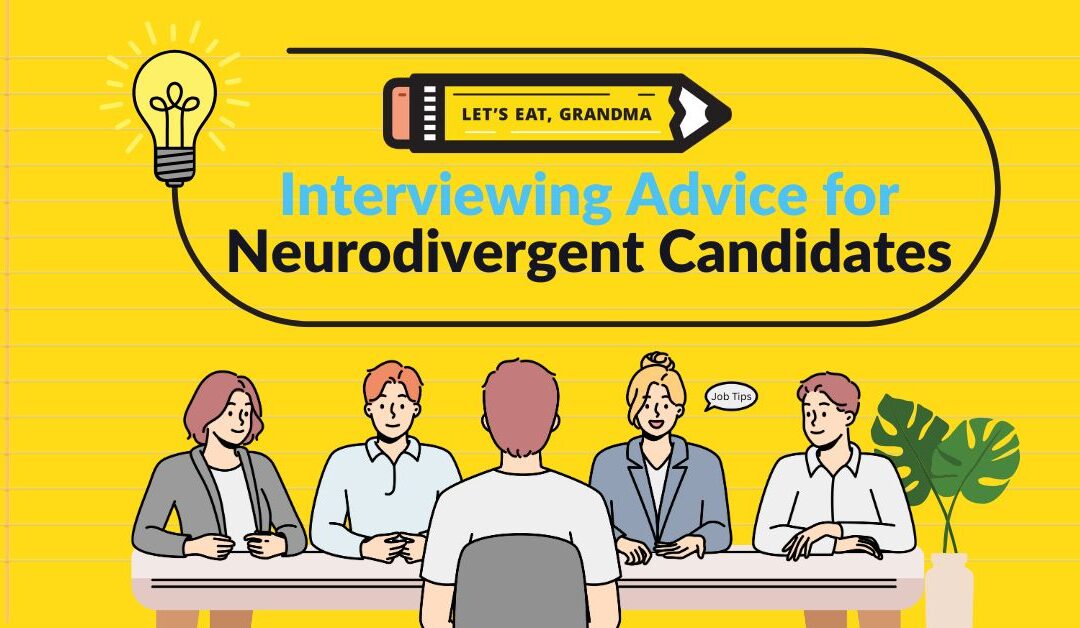Interviewing Advice for Neurodivergent Candidates
Written by: Ramon Santillan
Ramon Santillan is an interview coach and founder of PersuasiveInterview.com where he offers a specialized and a one-on-one tailored approach to the job search process for neurodivergent college students.
Preparing for interviews can seem like a daunting task full of uncertainties and pitfalls.
However, throughout my 14 years of coaching neurodivergent college students on how to turn interviews into job offers, I’ve created and tested a system that has helped them get awesome jobs in their chosen majors at great companies.
Below is the same step by step process I use with my clients to help them prepare for job interviews.
However, I will warn you: This may go against what you’ve been taught in that internship or co-op class you took in college, and that’s by design.
That internship/co-op class you took in college is designed so everyone in your major has a fair shot at getting a job.
My process is designed to help my clients get the job. It has been built specifically so they can outsmart their competition.
And I’m sharing it with you now.
First Step: Research the Company, the Job, and the Interviewer
First off, when preparing for an upcoming interview, make sure you know what the company does, what the job is about, and know in detail who your interviewer is.
I typically go to the company’s website and look at their “About” page to get an idea of what they do, any “Company Principles” they promote, as well as a quick Google search to see if anything interesting has come up recently like new developments or announcements. Write your observations down, especially those items that pertain to the job you’re interviewing for or are of interest to you.
The next thing I would research is the job.
I do this by taking the job description and comparing it to my resume. For each of the requirements and the qualifications, I would like to write out an example (or two) of when I’ve done that task including facts and figures about it.
For now, write out as much detail as you can including how many team members were involved, when you did the task, any challenges you faced, and any occurrences of when you were proud of what you did. If you don’t have any direct experience, feel free to use examples from class projects or other part-time jobs or volunteer work you did.
At the college level, employers are more interested in finding someone who has shown they can do a task even if it’s not directly related to the job. They know you’re not an expert so don’t be hard on yourself by thinking that you need to fully master a skill before you’re able to list it as experience.
Now it’s time to research the interviewer.
The easiest way to do this is to look them up on LinkedIn. You can usually find the name of the interviewer by looking at the calendar invite for the interview or you can ask the recruiter who set up the interview the name of the person. Once you have their name, type it in the search box in LinkedIn and use the filter options including company name to help you pinpoint the exact person.
By looking at their profile, you’ll gain valuable insights into how long they have been at that role, any previous jobs they’ve had, their school and major. If there is anything particularly interesting to you, make sure to write it down. This will be useful when coming up with questions you’ll ask during the interview.
Once you’ve done that, the next step is creating your ‘Interview Theme.’
Creating Your Interview Theme
Your Interview Theme refers to how you want to present yourself during the job search process. It’s not about “making up a persona” but rather thinking about how you want to be seen and remembered. Knowing your Interview Theme allows you to know what you want to say without memorizing it. The goal of the interview is to help YOU learn more about the company and have the Company learn about YOU.
Take some time to figure out how you want to be seen by the interviewer.
Examples include “hardworking, smart, dedicated, and open to learning”. Once you’ve decided how you want to be seen, think about how a person that has those qualities would answer a question. There is no right or wrong answer. The goal is to help you create a guide on how you want to answer questions.
Once you have an idea of what your Interview Theme will be, it’s time to practice interview questions.
You can search online for “Interview Questions for [job title] at [company name], and you’ll get some good suggestions. However, this isn’t meant to be an exercise in memorizing answers to questions. The goal here is to develop the story you want to tell about yourself. If your Interview Theme was to be seen as “smart, dedicated, and eager to learn”, then come up with examples where you have done that.
Another thing to keep in mind is that an interview isn’t a test.
There isn’t one right answer to the questions they ask. Any answer can be the right answer, as long as you present it the right way.
Storytelling During Job Interviews
Although it is good to know how you’ll answer a question, do not memorize a script. A script has to be said in a certain order for it to make sense. This can lead you to forgetting your script and messing up if you get anxious or nervous.
If instead you focus on how you want to be seen, you can tell the story in any way. When in doubt use the STAR Method. STAR stands for Situation, Task, Action, Result and is used as a guide to help you cover all the points in an answer.
If the STAR method sounds too complicated, you can use my method called the WWW Method. This stands for What happened?, What did you do?, and What ended up happening? Granted, it doesn’t roll off the tongue like STAR but it does the trick.
Many times candidates get nervous about questions like “Tell me about yourself” because they feel the questions are too open-ended.
In reality, the question isn’t open-ended at all.
The company is only interested in knowing how you can be the solution to their problem.
This isn’t to say that the company is evil and self-serving. What this means is that the company doesn’t care that you’re looking for a place to “grow and develop yourself”. What they’re looking for is for someone who can do the things that are on the job description. If you keep your answers focused on the job description, you’ll have a better chance of making a good first impression and turning the job interview into a job offer.
Don’t Interview. Have Conversations Instead
Forget about having interviews. Let the other people applying to jobs do that.
What you will be doing is having conversations. Why do you want to have a conversation? Because companies don’t hire people based on technical skills. If this were true, then companies would hire just based on the resume. “This guy has 5 years of experience and this other one has 4. 5 is more than 4 so hire the one with the most experience”. Technical skills are important but companies hire people they like the most.
How do you get people to like you the most out of all the candidates? By having conversations.
The easiest way to have conversations is by having questions you want to ask. The interviewer asks you something, you answer, and then you ask something along the same lines back to them. Presto! You have a conversation!
By having a conversation as opposed to an interview, you’ll feel more comfortable and less anxious about how you come across and communicate with your interviewer.
Ask Questions You Want a REAL Answer to
Most candidates go into interviews without considering what sort of questions they should ask.
Typically they ask “canned questions” meaning questions that don’t go into depth about what the job entails or what they’re looking for in a candidate. An example of a “canned question” is “Tell me about the typical day”. The answer you’ll get will probably be around the lines of “Hahaha! No day is the same. Every day here is different”. It doesn’t really tell you anything about what you need or want to know about the job or company.
For a more insightful response, consider asking “Which one of my skills would I use the most during the typical workday?” This is a better question because it asks something specific and not open ended.
The rule of thumb here is to ask questions you really want an answer to.
If you’d like other examples of questions YOU should ask during an interview, you can check out this useful article I wrote on the topic: Interview Questions YOU should ask during the interview.
I always recommend my clients write at least 5 questions and instead of trying to memorize them, I encourage them to write them down in a notepad they take to the interview.
No need to hide the notepad. In fact, you should bring it out during the interview.
On one side of your notebook you should write your 5 questions and on the other write down some topics you’d like to cover during the interview based on the job description. This frees up mental space for you to focus on the interview and not have to worry about memorizing and/or forgetting the questions you want to ask.
When and How to Disclose
Disclosing your neurodivergent status is a very personal and intimate matter.
You decide who you disclose to and when. Although it is a federally protected status, some candidates are not comfortable discussing in their application any accommodations they may need.
If you decide to disclose, I recommend that you do it when you’re interviewing with the hiring manager.
You can start the conversation by asking “Are you familiar with people who are neurodivergent/on the spectrum/Asperger’s/HFA/etc?” After they answer, you can explain how it affects you both negatively and positively. The goal here is to have the interviewer know that your diagnosis is not a setback and rather a way that benefits the company and the way you perform the job.
This is your opportunity to present yourself in the way you want to be seen.
Some candidates don’t feel comfortable disclosing until after they get an offer and that is also fine. It is better to do so when you’re comfortable and able to explain and answer any questions your employer may have about any accommodations you may need.
Closing Thoughts
Interviewing can be a challenging moment in your job search; however, with the right preparation, I am confident that you’ll be able to reach your goals.
And remember “Practice doesn’t make perfect. Perfect practice makes perfect.”





